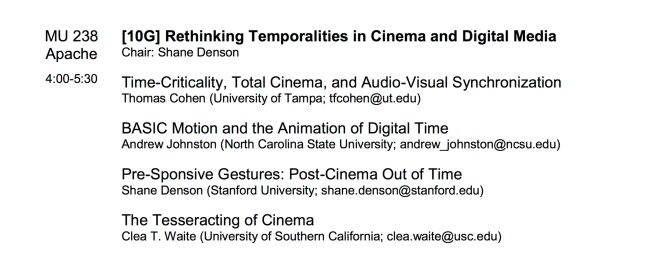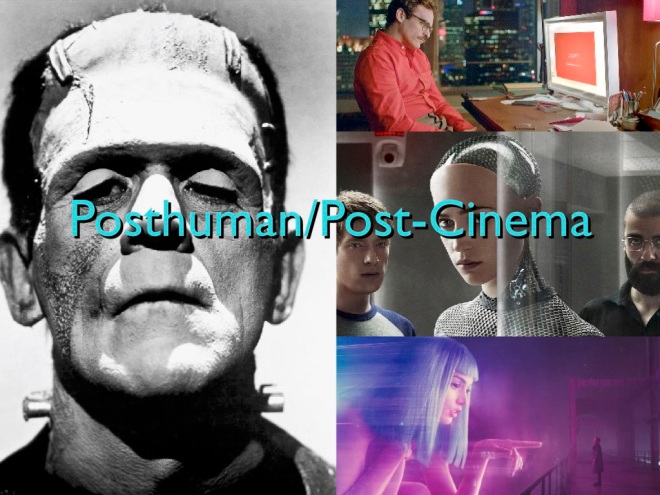
Today, the second of three events in Australia: “Posthuman/Post-Cinema,” hosted by Bruce Isaacs at the University of Sydney.

Today, the second of three events in Australia: “Posthuman/Post-Cinema,” hosted by Bruce Isaacs at the University of Sydney.
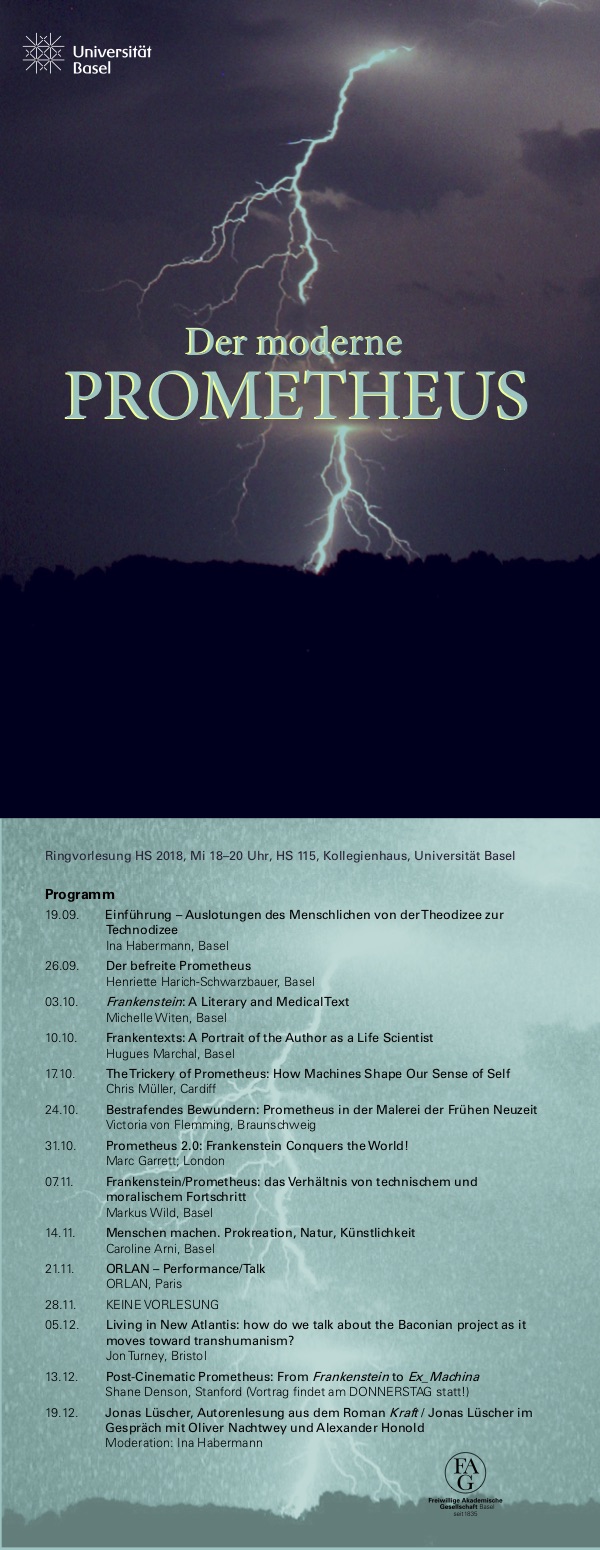
I am very happy to be a part of this great lecture series on Der moderne Prometheus/The Modern Prometheus this fall at the University of Basel. On December 13, 2018, I will present “Post-Cinematic Prometheus: From Frankenstein to Ex_Machina.” More info to follow.
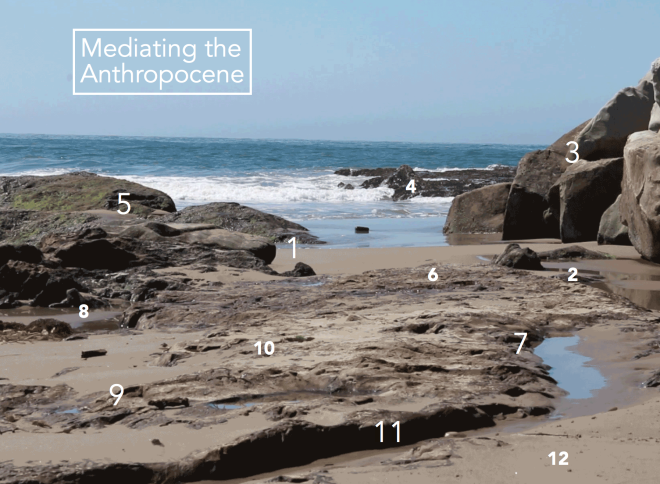
The new issue of Media Fields, devoted to the topic of “Mediating the Anthropocene,” is out now. Included among the many exciting contributions is my article “Post-Cinema After Extinction.” Check out the whole issue here.
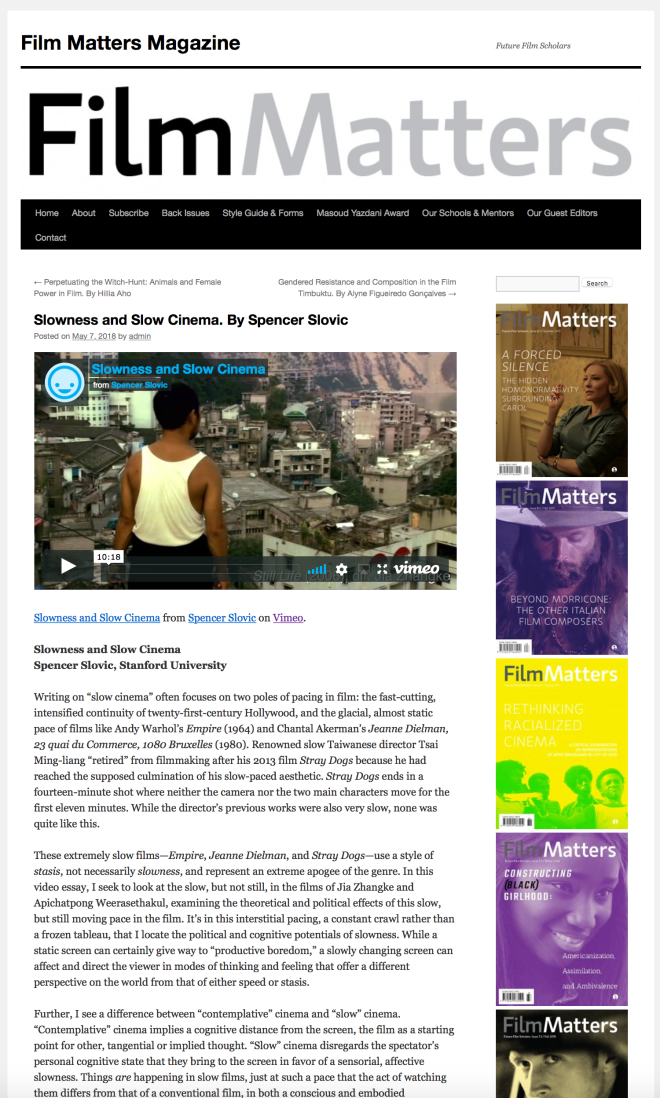
My student Spencer Slovic has just published an excellent video essay on “Slowness and Slow Cinema” at Film Matters, which will be of interest to people thinking about contemporary and world cinema, or simply interested in the medium of the video essay (and this is a very good one!).
Spencer’s video grew out of an assignment for my “Post-Cinema” seminar, which I taught in the winter quarter of 2017. An earlier version was featured in the exhibition I curated at Stanford, Post-Cinema: Videographic Explorations (you can still see all of the videos online).
In any case, the version featured in Film Matters is much improved, having gone through a rigorous peer-review process. Take a look!
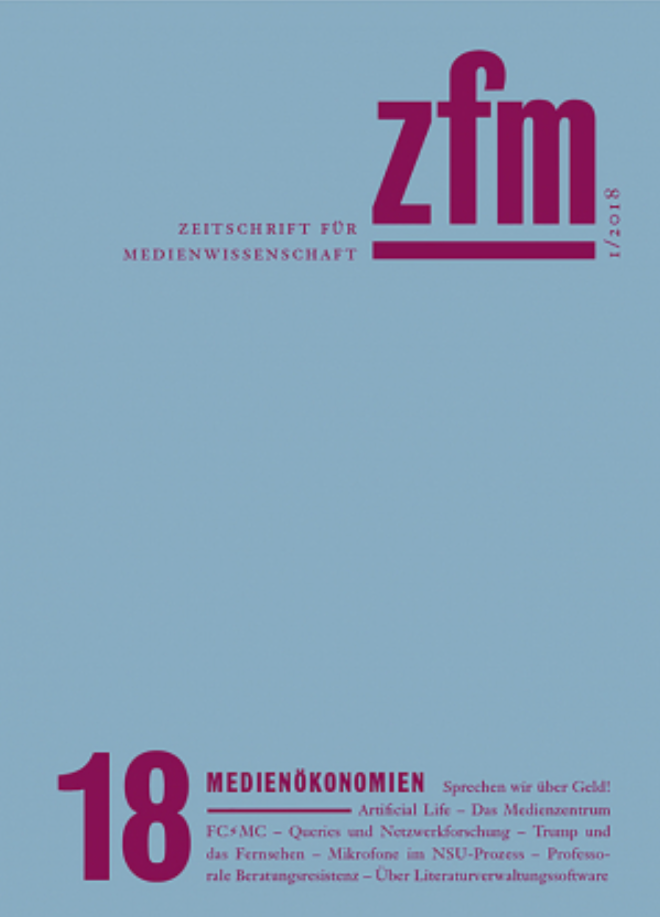
There is a new review of several works on all things post-cinematic, including Post-Cinema: Theorizing 21st-Century Film (which I co-edited with Julia Leyda), alongside Francesco Casetti’s The Lumière Galaxy; Malte Hagener, Vinzenz Hediger, and Alena Strohmaier’s edited collection The State of Post-Cinema; Vinzenz Hediger and Miriam de Rosa’s special issue Post-What? Post-When?; and Astrid Deuber-Mankowsky’s Queeres Post-Cinema.
The review, in German, is titled “Werden/Weiter/Denken: Rekapitulation eines Post-Cinema Diskurses” (roughly: Becoming/Further/Thinking — suggesting a thinking in flux and a thinking beyond — Recapitulation of a Post-Cinema Discourse). The text, by Elisa Linseisen from the Ruhr-Universität Bochum, appears in Zeitschrift für Medienwissenschaft 18 (2018). The full text is available as an open-access PDF.
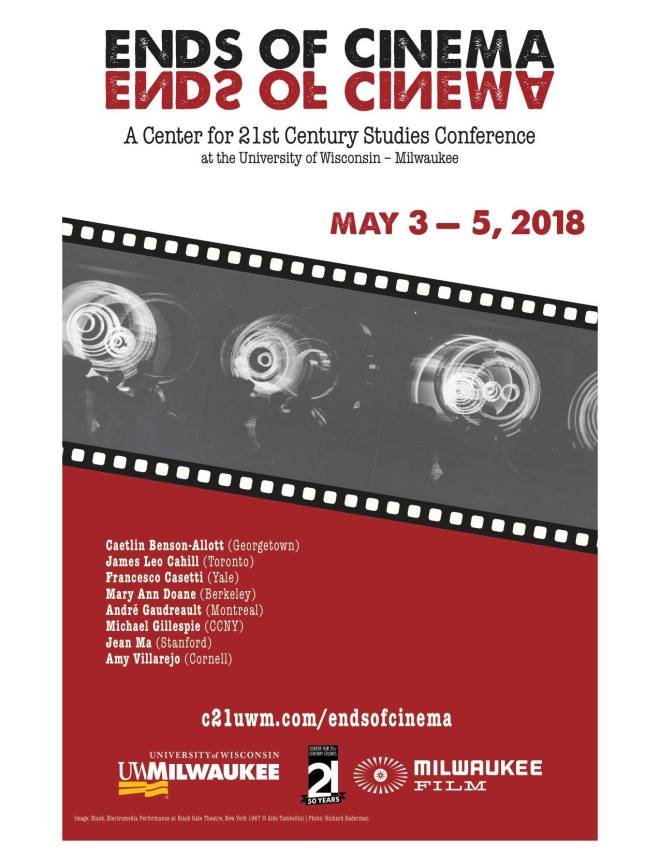
I am excited to be participating in the Ends of Cinema conference at the Center for 21st Century Studies, taking place May 3-5, 2018 at University of Wisconsin Milwaukee. There are some great keynote speakers, including my colleague Jean Ma and lots of other wonderful people. The C21, under the expert leadership of Richard Grusin (who is now back at the helm after a short hiatus), has put on some of my personal favorite conferences, and I expect this one to be no less exciting and thought-provoking.
My own contribution will be a paper titled “Post-Cinematic Realism” — work in progress for my current book project Discorrelated Images. Here is the abstract:
Post-Cinematic Realism
Shane Denson, Stanford University
In its classical formulation, cinematic realism is based in the photographic ontology of film, i.e. in the photograph’s indexical relation to the world, which grants to film its unique purchase on reality; upon this relation also hinged, for many realist filmmakers, the political promise of realism. Digital media, meanwhile, are widely credited with disrupting indexicality and instituting an alternative ontology of the image. David Rodowick, for example, argues that the interjection of digital code disrupts film’s “automatisms” and eradicates the index in favor of the symbolic. But while such arguments are in many respects compelling, I contend that the disruption of photographic indexicality might also be seen to open up spaces in which to explore new automatisms that communicate reality and/or realism with and through post-indexical technologies.
Whereas André Bazin privileged techniques like the long take and deep focus for their power to approximate our natural perception of time and space, theorists like Maurizio Lazzarato and Mark Hansen emphasize post-cinematic media’s ability to approximate the sub-perceptual processing of duration executed by our pre-personal bodies. The perceptual discorrelation of computational images gives way, in other words, to a more precise calibration of machinic and embodied temporalities; simultaneously, the perceptual richness of Bazin’s images becomes less important, while “poor images” (in Hito Steyerl’s term) communicate more directly the material and political realities of a post-cinematic environment. As I will demonstrate with reference to a variety of moving-image texts employing glitches, drones, and other computational objects, post-cinematic media might in fact be credited with a newly intensified political relevance through their institution of a new, post-cinematic realism.
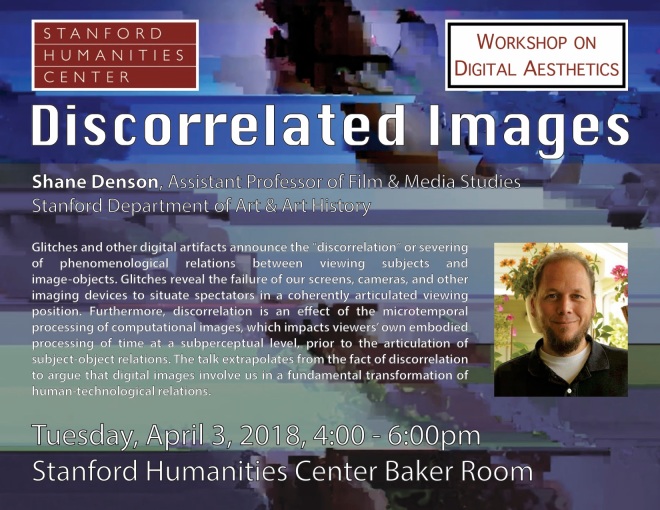
On Tuesday, April 3, 2018 (4:00-6:00pm), I will be giving a talk titled “Discorrelated Images” in the context of the Digital Aesthetics Workshop at the Stanford Humanities Center. The talk draws on my current book project of the same title and will address primarily temporal and affective relations and transformations occasioned by digital images.
Participants are encouraged (but not required) to read my chapter “Crazy Cameras, Discorrelated Images, and the Post-Perceptual Mediation of Post-Cinematic Affect” prior to the event.
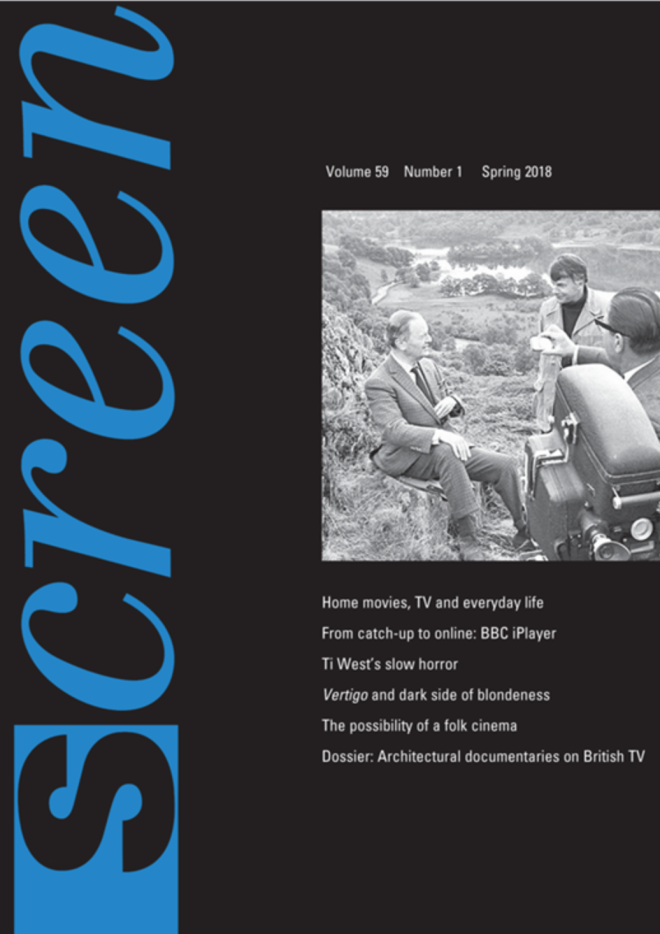
Lisa Åkervall has a review out in the latest issue of Screen, covering three works on post-cinema: 1) the open-access volume that I edited with Julia Leyda, Post-Cinema: Theorizing 21st-Century Film; 2) the special issue of Cinéma & Cie (16:26-27, 2016), titled ‘Post-what? Post-when? Thinking moving images beyond the post-medium/post-cinema condition,’ edited by Miriam de Rosa and Vinzenz Hediger (which also includes my article on “Speculation, Transition, and the Passing of Post-Cinema”); and 3) Malte Hagener, Vinzenz Hediger, and Alena Strohmeier’s edited collection The State of Post-Cinema: Tracing the Moving Image in the Age of Digital Dissemination.
About the collection I co-edited with Julia Leyda, Åkervall writes:
“Shane Denson and Julia Leyda’s comprehensive volume Post-Cinema: Theorizing 21st-Century Film, an open access online publication by Reframe Books, presents a multifaceted compendium. […] The editors’ framing in Post-Cinema is precise and penetrating, flexible enough to accommodate enduring themes in film and media studies while also making allowances for new questions associated with topics such as digital media aesthetics, media archaeology and environmental studies. Their volume rejects the idea that postcinema is merely a successor to cinema or a step in the teleological digitalization of all media, instead identifying it with competing perspectives on a changing media situation that bears on cinema as an institution, a practice and a medium. In this respect the volume admirably addresses our changing media landscape.”
Read the full review here.
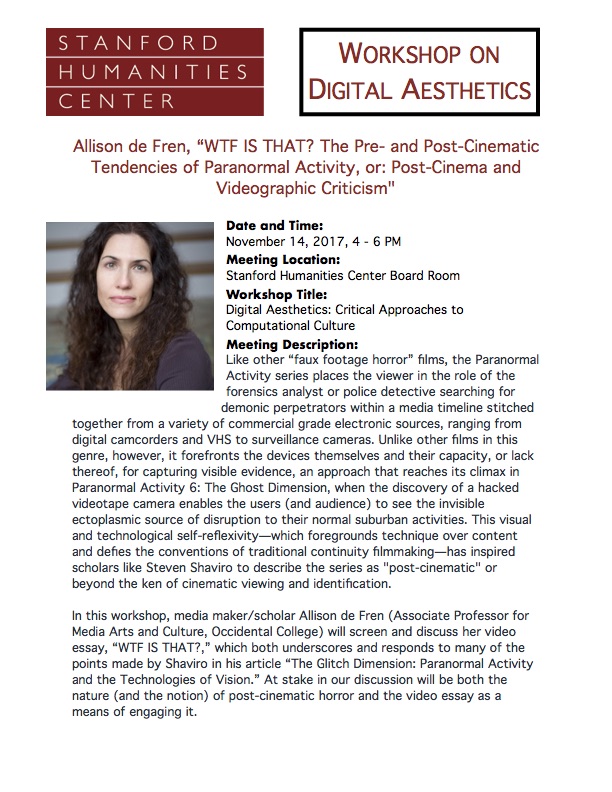
On Tuesday, November 14, 2017, media maker/scholar Allison de Fren will be discussing post-cinema and videographic criticism with the Digital Aesthetics Workshop at the Stanford Humanities Center, focusing on her video essay “WTF IS THAT? The Pre- and Post-Cinematic Tendencies of Paranormal Activity” and Steven Shaviro’s article “The Glitch Dimension: Paranormal Activity and the Technologies of Vision.”
This event follows a screening of de Fren’s documentary and videographic work on fembots the night before (more details here).
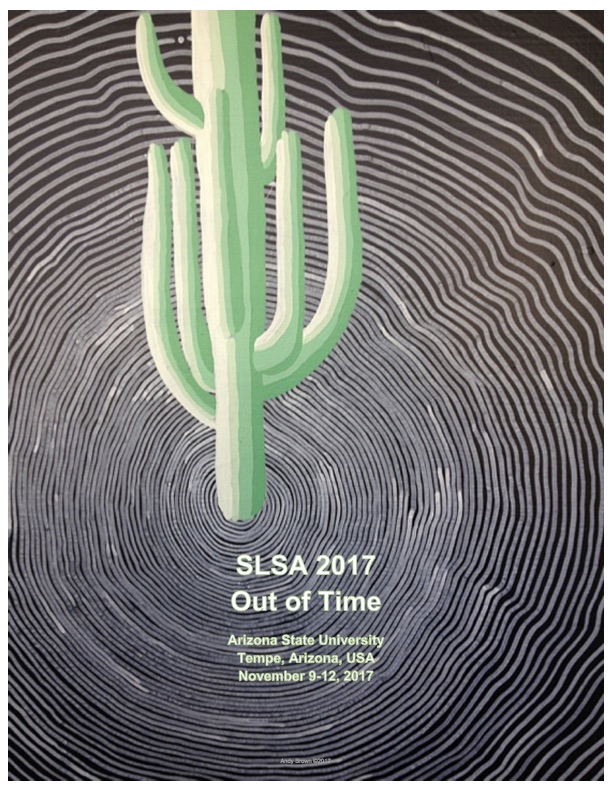
At this year’s SLSA conference, “Out of Time,” hosted by Arizona State University, I will be chairing a panel titled “Rethinking Temporalities in Cinema and Digital Media” (Saturday, November 11, 2017; 4:00-5:30pm). My own talk is titled “Pre-Sponsive Gestures: Post-Cinema Out of Time.” Here is the complete list of panelists and topics:
